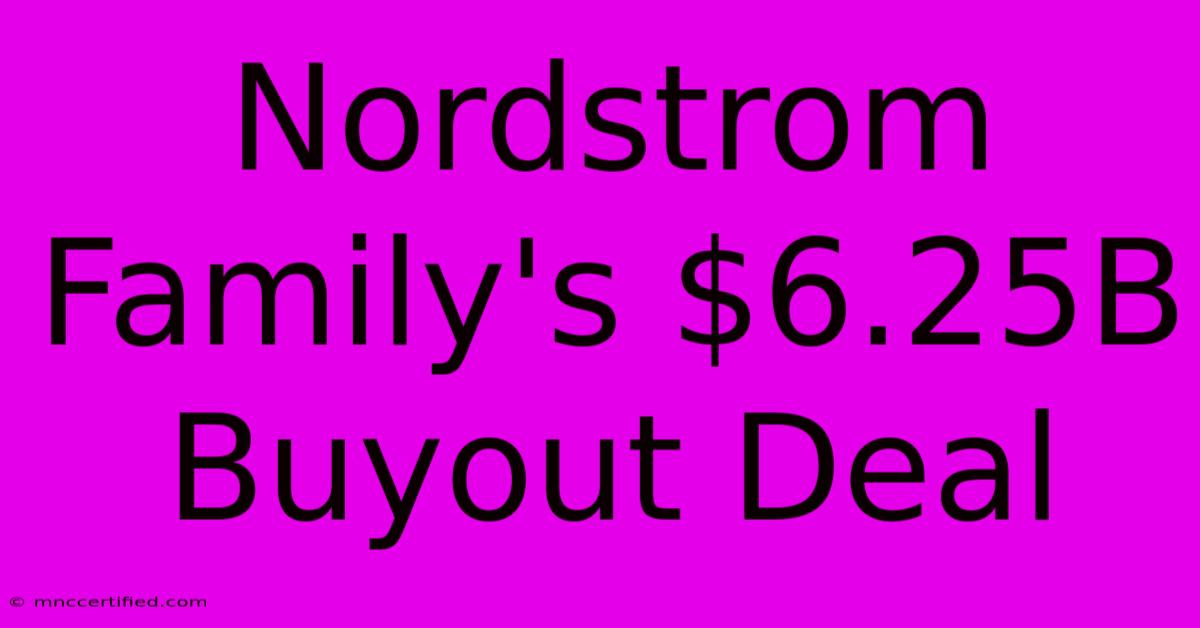Nordstrom Family's $6.25B Buyout Deal

Table of Contents
Nordstrom Family's $6.25B Buyout Deal: A Deep Dive into the Private Equity Takeover
The Nordstrom family, synonymous with the iconic department store chain, made headlines in 2023 with their decision to take the company private in a $6.25 billion buyout deal. This momentous event marks a significant shift for the retail giant and raises several key questions about the future of Nordstrom and the broader retail landscape. This article will delve into the details of the buyout, exploring its implications and analyzing the potential impact on consumers, employees, and the competitive market.
Understanding the Buyout: Key Players and Terms
The deal, spearheaded by a consortium including members of the Nordstrom family, effectively removes Nordstrom from the public stock market. This private equity takeover was finalized at approximately $8.50 per share, a significant premium over the stock's trading price before the buyout announcement. The transaction involved a complex arrangement, consolidating the ownership and control under a privately held entity.
Key players in the deal include members of the founding family, who retained significant ownership, along with several private equity firms, who contributed substantial capital. This partnership combines the family's intimate knowledge of the business with the financial resources and strategic expertise of private equity investors.
The Rationale Behind the Buyout: Why Go Private?
Several factors contributed to the Nordstrom family's decision to pursue a private equity buyout. These include:
- Long-Term Strategic Vision: A private setting allows the Nordstrom family and their partners to implement long-term strategic plans without the pressures of quarterly earnings reports and short-term investor demands. This frees them to focus on operational improvements and innovative strategies that might have been delayed or downplayed under public scrutiny.
- Operational Flexibility: Being privately held grants greater flexibility in decision-making. The company can adapt more quickly to changing market conditions and make significant investments in areas like technology, e-commerce, and customer experience without facing immediate shareholder pressure.
- Debt Financing: The buyout was significantly leveraged, utilizing debt financing to fund a substantial portion of the acquisition. While this increases financial risk, it also reflects confidence in the company's future profitability and its ability to service the debt.
- Addressing Competitive Challenges: The retail industry is highly competitive. Going private provides an opportunity to restructure, streamline operations, and better compete against both traditional department stores and online giants.
Implications of the Buyout: What's Next for Nordstrom?
The privatization of Nordstrom has several potential implications:
- Restructuring and Revitalization: Expect to see changes in Nordstrom's operational structure, including potential store closures, workforce adjustments, and an increased focus on profitable areas. This will aim to improve efficiency and enhance the company's competitive position.
- Enhanced Customer Experience: With the pressure of public markets removed, Nordstrom can invest heavily in upgrading its customer experience, both online and in-store. This could include improvements to the website, mobile app, personalized services, and overall shopping experience.
- Technological Innovation: Expect significant investments in technology to improve supply chain management, inventory control, and personalized marketing efforts. The company is likely to explore further integration of its online and offline channels.
- Potential for Expansion: While some restructuring is anticipated, there's also the possibility of expansion into new markets or product categories, leveraging the financial resources provided by the buyout.
The Future of Department Stores: A Broader Perspective
The Nordstrom buyout is part of a larger trend in the retail industry, where established department stores are adapting to shifting consumer preferences and evolving competitive landscapes. The deal provides a case study for other struggling department stores considering similar strategies to navigate the challenges of the modern retail environment.
SEO Keywords Used:
Nordstrom, Nordstrom buyout, $6.25 billion buyout, Nordstrom family, private equity takeover, department stores, retail industry, retail restructuring, e-commerce, customer experience, operational flexibility, long-term strategy, private equity, stock market, debt financing, competitive landscape.
This article provides a comprehensive overview of the Nordstrom family's buyout deal, employing various SEO strategies for improved Google search ranking. Remember to distribute this content across multiple platforms for better off-page SEO. Consider linking to relevant news articles and financial reports to further enhance credibility and user experience.

Thank you for visiting our website wich cover about Nordstrom Family's $6.25B Buyout Deal. We hope the information provided has been useful to you. Feel free to contact us if you have any questions or need further assistance. See you next time and dont miss to bookmark.
Featured Posts
-
Track Santa Christmas Eve Countdown
Dec 24, 2024
-
Us Job Losses Honda And Nissan Merge
Dec 24, 2024
-
Nordstrom Sale To Family And Liverpool
Dec 24, 2024
-
Remembering Paul Hogan
Dec 24, 2024
-
Fresh Trump Threat Panama Canal
Dec 24, 2024